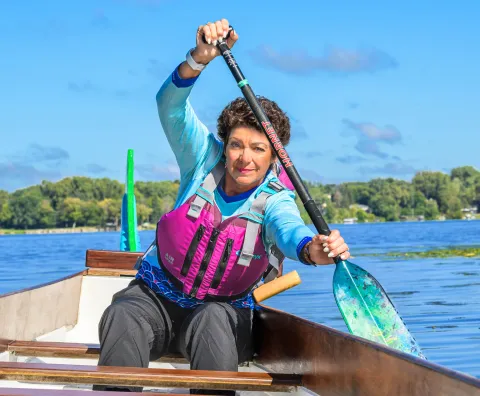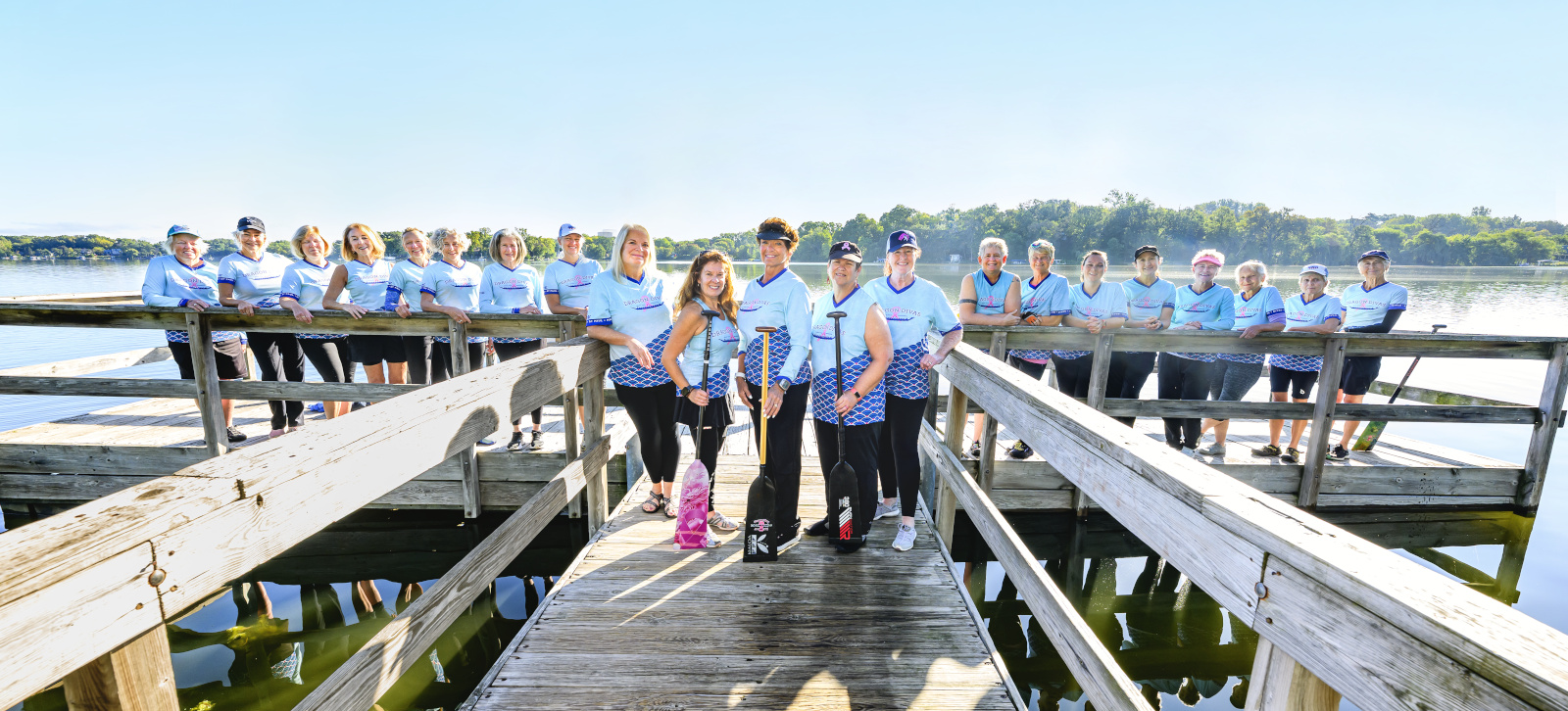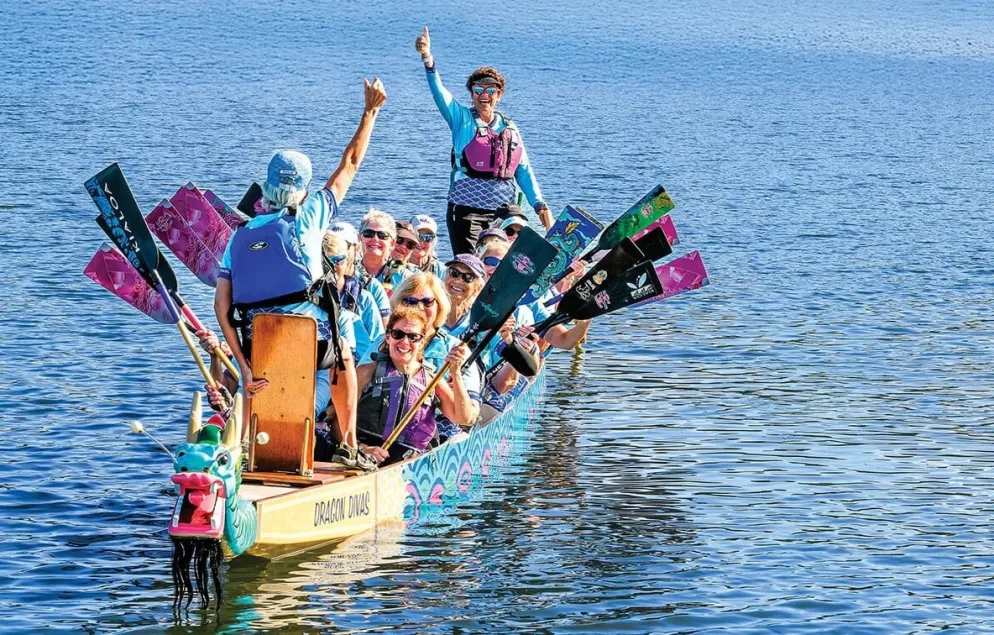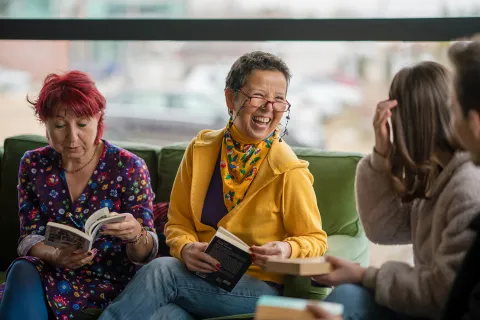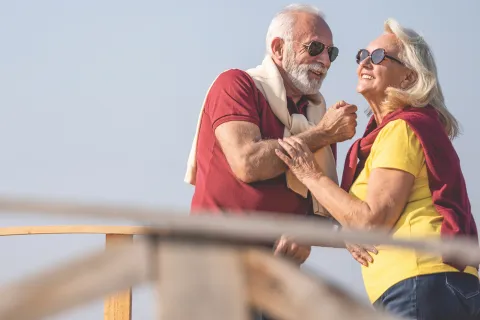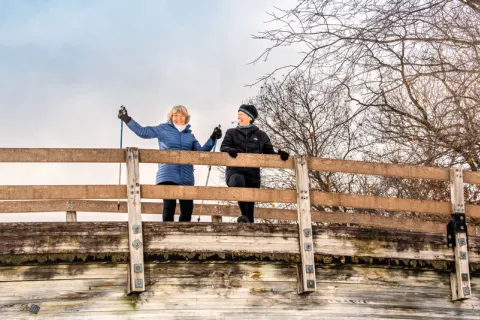Paddle Forward
From Lake Gervais in Little Canada, you might hear the voices of 22 women singing, “One heart, one beat, one boat.” They are the Dragon Divas, a breast cancer support group and dragon boat racing team, gathering there multiple times a week to train for dragon boat racing while finding support and community with other breast cancer survivors.
Standing at the stern of the boat is Cindi Fitch, the team’s 68-year-old coach, shouting instructions and words of encouragement in between laughter and conversation.
“It’s an amazing community,” says Fitch. “It’s a powerful thing when you get a bunch of strong women together — and now we’re going to paddle a boat!”
Cindi grew up around various cities in the Midwest, but happily settled in Minneapolis. It’s no surprise she chose the city of lakes. Between kayaking, pontooning and jet skiing, she’s always loved watersports of all kinds. When she saw an article in the paper about the Dragon Divas in 2010, Cindi knew she immediately had to learn more.
“It's athletic, it's exercise, it's breast cancer, it's on the water. It's a community that I need to join,” she recalls thinking.
She happened to join the Dragon Divas just as the team was getting started. Over the next fifteen years, both her position in the team, as well as the team itself, blossomed. Cindi moved from paddler to coach, and the team grew to over 130 members who range in age from mid-thirties to late eighties. Some are in remission, some still in treatment and some are currently in stage four of breast cancer.
“We don’t know how long they’re gonna be with us, but they’re still coming to practice,” she says, noting that the community is healing for all involved.
Racing through history and hope
Originally created in Ancient China, dragon boats are long, canoe-like vessels that are powered by paddlers, a steerer and a drummer. The modern era gathered steam in 1976 when the Hong Kong Tourist Board hosted the first International Dragon Boat Festival, inspiring crews worldwide to create their own associations.
DRAGON DIVA DATES
Dragon boating has a rich and storied history, the foundation of what the Dragon Divas have become today.
Approximately 2000 years ago: The creation of dragon boating in China
1976: First Hong Kong International Races
1991: Formation of the International Dragon Boat Federation
1996: Dr. McKenzie forms the first breast cancer dragon boat team.
2006: The founding of the Dragon Divas
Why dragon boats? According to the International Breast Cancer Paddlers’ Commission (IBCPC), it’s “the epitome of strenuous, repetitive upper body exercise.” Dr. McKenzie measured the arms of the participants before and after the study and found that the women who didn’t have lymphedema did not develop it, and the condition did not get worse for the ones who had it. In fact, everyone reported better health and mood following the study.
That was just the beginning. In 2007, the IBCPC formed, and it now holds festivals across the world approximately every four years. Past locations have included Toronto; Sarasota, Florida; Florence, Italy; and New Zealand. Next year they’re going to the French Alps.
Cindi and the Dragon Divas plan to attend. “It’s, to us, like the Olympics,” she says.
There’s a flower ceremony at the start of each festival where all the competing teams will throw flowers and petals into the river to honor those they’ve lost to breast cancer and those still battling it.
The origin of the Dragon Divas
The Dragon Divas team was formed by Dr. Mary Skrypek, who worked with women with breast cancer who had lymphedema, and was later diagnosed with breast cancer herself. Every year, she’d attend a conference focused on women and cancer. One year, the keynote speaker was a physical therapist who was diagnosed with breast cancer and had worked with Dr. McKenzie to develop his study on dragon boats and lymphedema.
“I had just been diagnosed with breast cancer, and paddling the dragon boat was the one bright spot I could focus on,” Dr. Skrypek says. “It really spoke to me and helped me envision how I wanted to move forward in my diagnosis — I wanted my friends and family to see that I was going to live, and I was going to live well.”
The Dragon Divas are one of 260+ breast cancer paddler teams worldwide
At that same conference, she attended a session on how to start a dragon boat team. When she got back to the Twin Cities, she set out to create her own dragon boat team and spread the word. One newspaper article reached Cindi Fitch.
At that point, Cindi was a few years into remission from breast cancer. “I’d already gone through a lot, I was healing. But you have that emotional thing you’re thinking, ‘Is this going to happen again?’” she says. “All these questions, and this group helps with those answers and that support.”
At the start of every practice, the Divas assume an “attitude of gratitude.” They’ll go out to the middle of the lake with their boats and take 10 minutes to reflect and share what’s on their minds. Even when they’re pressed for time, they never skip this part of practice, Cindi says.
It’s during conversations like these, she notes, when the group can talk about things that they might not discuss with their friends, families or partners. Because everyone’s been diagnosed with breast cancer, they can laugh and freely talk about their bodies and experiences, and know they’ll be met with support and understanding.
“We rejoice with people when they get good scan results or when they're done with chemo, and we're also there to help each other out,” says teammate Donna Jensen. “When someone gets bad news, if cancer returns or if other medical issues, family or any other type of issue comes up, we're there to support one another.”
“You can bring your whole self there,” says fellow teammate, Lisa Lynch. “People have a lot of life happening outside of breast cancer. It's been a really great and amazing supportive environment — and it's fun to compete.”
Every week, there are four available one-hour training sessions on Lake Gervais in Little Canada. While there’s one part of the team that trains competitively, there’s also a part of the team that comes mainly for the social component. After every practice, they’ll have a social hour where everyone’s invited and they’ll hang out “until the bugs eat us up,” Cindi says.
All Aboard!
The Dragon Divas compete in dragon boat festivals throughout the Midwest. And every four years, they travel across the world to compete in the International Breast Cancer Paddlers Commission’s Participatory Dragon Boat Festival. “To us, it’s like the Olympics,” Cindi says.
Coach Cindi
Cindi had been paddling with the Divas for years, outlasting several coaches who didn’t quite fit with the team. After some difficulties with a coach, a teammate encouraged Cindi to step into a leadership role. The team offered to cover the cost of a coaching clinic if she was willing to take on the responsibility.
Initially, she turned them down since the team had a rule against hiring internal coaches and she felt hypocritical. But after much discussion, she agreed and became a certified coach. Her practices are filled with reminders that they’ve trained hard, they’ve built strong muscles, and to be “flexible like a pretzel.”
“She’s a great leader — she does it with kindness, but she also does it so that we get stronger in what we’re doing,” Dr. Skrypek says. “She’s willing to do anything so that we succeed.”
Donna agrees. “She's really willing to help out wherever is needed — or with any kind of help that someone needs, not even related to the coaching piece,” she says. “She's always attentive to our safety and wellbeing on the boat and off the boat.”
Cindi credits her career experience in leadership positions in real estate and hospitality for her talent as a coach. “I think that has really translated into my coaching and leadership of the Dragon Divas,” she explains. “It was a natural progression.”
Dragon boat season lasts from May to October, but Cindi leads the Divas all year. “My motto is: improve yourself, improve your team,” she says. “You’re gonna walk, you’re gonna do aerobics, you’re gonna do strength training because it’s good for you ladies and it’s really good for breast cancer recovery.”
Leading by Example
While Cindi has guided countless women through their first strokes and beyond, she’s also grown alongside them. She’s learned how to help teammates paddle safely after a mastectomy, refine their strokes without causing injury and adapt to the evolving demands of dragon boat racing.
With three coaches currently on the team — and four more joining to help train 25 new members this season — Cindi is finding ways to step back and let others take the lead, passing on her knowledge and building up new leaders.
Beyond the paddling, medals and social hours, it’s the friendships, laughter and shared sense of purpose that keep her motivated. And her impact extends beyond the team.
“I really want to set a good example for my daughter and my granddaughters,” Cindi says. “Look what your grandma’s doing — bringing home medals and being active and showing them that if down the road you get breast cancer, you can come out on the other end of it being a successful, healthy human being.”
DID YOU KNOW?
Paddling and rowing are two different things. Paddlers face forward in the direction they’re traveling, rowers move backward while facing the opposite direction. And paddles aren’t locked into the boat, unlike rowers’ oars.
SB MID: H2425_110625_O01_C
MA/PB MID: MID Y0138_110525_P01_C

